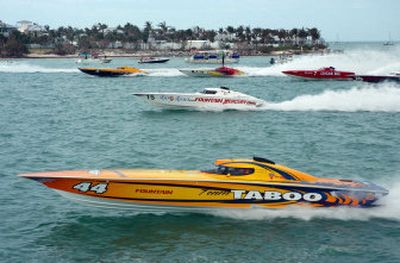Cigarette boats proliferate

Forget about the Bentley, the Gulfstream jet and the sprawling mansion. Nothing says conspicuous consumption quite like a cigarette boat.
These high-powered watercraft cost as much as $1 million, create giant wakes, consume thousands of dollars in fuel in a single day and can drown out conversations half a mile away.
Now comes a push that is further stirring the waters. Just as Americans begin hitting the beaches for the season, promoters are bringing cigarette-boat races to lakes and rivers from Toronto and New York to Las Vegas and Heber Springs, Ark. With dollar sales of these aggressive-looking, low-slung boats rising more than 20 percent in recent years, this is shaping up to be the summer of the cigarette boat.
The boats are increasingly coming into contact with everyone from weekend boaters and sailors to fisherman, beachgoers and wildlife conservationists. But perhaps no group is more affected than the owners of America’s 4.5 million waterfront homes. They are leading a backlash against cigarette boats that’s dividing neighbors in some resort communities and producing heated debates about regulation in state capitols from Alabama to New Hampshire.
This summer, two competing offshore racing circuits will host a record 22 events across North America, with as many as 38 boats – some piloted by professionals, others by weekend warriors – completing fast laps on a course that takes them as close as 20 feet to shore. As the sport expands, it has attracted a roster of corporate sponsors; “We look at it as Nascar on the water,” says a spokesman for one sponsor, the Hard Rock Hotel in Hollywood, Fla.
The sight of a few dozen howling boats traveling close to shore at speeds of as much as 170 mph isn’t everyone’s cup of tea, of course, and the sport has created fault lines that turn on everything from money and politics to the different ways people define “recreation.” Critics say these boats, which can churn out more than 100 decibels (just short of the average thunderclap) are an abomination.
The boating industry argues that occasional cigarette-boat races, sanctioned by local authorities, should be allowed. “Boating is an important industry economically, and it’s also an important industry socially,” says Thom Dammrich, president of the National Marine Manufacturer’s Association. Dammrich adds that boat technology is becoming more environmentally friendly. At the behest of the EPA, manufacturers are lowering emissions, quieting engines, and making boats more fuel-efficient. As for the noise, he says, “It’s probably no louder than Nascar racing.”
Homeowners say cigarette boats create wakes that test dock tethers and erode shorelines, and make an unbearable noise. This weekend, when marketing executive Mari Mansfield and her husband head up to their country home on Lake Gaston, N.C., they’ll be packing earplugs. “Each season, there are more and more” cigarette boats, says Mansfield. “We sit on our dock, enjoy the view of the water and the roar of Nascar. I just complain into my cocktail.”
Cigarette boats are a small subset of the $9 billion powerboat business, which has suffered from flat or declining sales for much of the decade. But manufacturers say these upscale models are selling well and produce higher profit margins than fishing boats or other types of pleasurecraft.
Though the company sold fewer of the boats last year, Fountain Powerboat Industries of Washington, N.C., which accounts for about half the cigarette-boat market, says it sold $33.8 million of these models in 2005, up about 4 percent from 2004 and 27 percent from 2003.